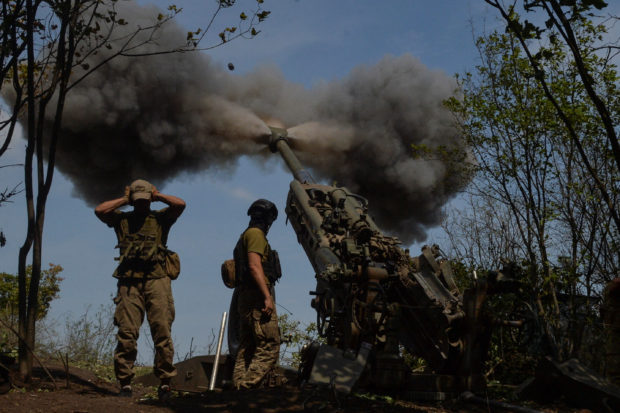
Ukrainian servicemen fire a M777 howitzer at a position on a front line, as Russia’s attack on Ukraine continues, in Kharkiv region, Ukraine August 1, 2022. REUTERS/Sofiia Gatilova
ISTANBUL — Russia on Tuesday accused the United States of direct involvement in the Ukraine war while the first ship carrying Ukrainian grain to world markets since Moscow’s invasion anchored safely off Turkey’s coast after a problem-free journey.
Russia said it was responding to comments by Vadym Skibitsky, Ukraine’s deputy head of military intelligence, about the way Kyiv had used U.S.-made and supplied High Mobility Artillery Rocket System (HIMARS) launchers based on what he called excellent satellite imagery and real-time information.
Skibitsky told Britain’s Telegraph newspaper there was consultation between U.S. and Ukrainian intelligence officials before strikes and that Washington had an effective veto on intended targets, though he said U.S. officials were not providing direct targeting information.
Russia’s defense ministry, headed by a close ally of President Vladimir Putin, said the interview showed that Washington was entangled in the conflict despite repeated assertions that it was limiting its role to arms supplies because it did not want a direct confrontation with Moscow.
“All this undeniably proves that Washington, contrary to White House and Pentagon claims, is directly involved in the conflict in Ukraine,” the Russian defense ministry said in a statement.
“It is the Biden administration that is directly responsible for all Kyiv-approved rocket attacks on residential areas and civilian infrastructure in populated areas of Donbas and other regions, which have resulted in mass deaths of civilians.”
There was no immediate reaction from the White House or Pentagon to the ministry’s assertions.
The Pentagon did deny, however, Moscow’s claims that Russia had destroyed six U.S.-made HIMARS since the war in Ukraine began on Feb. 24. Russia regularly claims it has hit HIMARS but has yet to show proof.
Ukraine and the West accuse Russia of carrying out devastating missile attacks on civilian targets on an almost daily basis. Both sides deny deliberately targeting civilians.
The accuracy and long range of missile systems provided by the West were intended to reduce Russia’s artillery advantage, but Ukrainian President Volodymyr Zelensky on Tuesday night said that despite those supplies, his country’s forces could not yet overcome Russian advantages in heavy guns and manpower.
“This is very much felt in combat, especially in the Donbas. … It is just hell there. Words cannot describe it,” he said.
A Russian diplomat said at the United Nations that the conflict in Ukraine does not warrant Russia’s use of nuclear weapons, but Moscow could decide to use its nuclear arsenal in response to “direct aggression” by NATO countries over the invasion.
At a nuclear non-proliferation conference, diplomat Alexander Trofimov said Moscow would only use nuclear weapons in response to weapons of mass destruction or a conventional weapons attack that threatened the existence of the Russian state.
“None of these two hypothetical scenarios is relevant to the situation in Ukraine,” Trofimov, a senior diplomat in the non-proliferation and arms control department of Russia’s foreign ministry, told the U.N. conference to review the Treaty on the Non-Proliferation of Nuclear Weapons.
Safe passage
Meanwhile, a July 22 U.N.-brokered deal to unblock the export of Ukrainian grain had an initial success. Turkey said that the first loaded ship since Russia’s invasion more than five months ago was safely anchored off the Turkish coast.
The vessel, the Sierra Leone-flagged Razoni was at the entrance of the Bosphorus Strait, which connects the Black Sea to world markets, around 1800 GMT on Tuesday, some 36 hours after leaving the Ukrainian port of Odesa.
A delegation from the Joint Coordination Center (JCC) in Istanbul, where Russian, Ukrainian, Turkish and U.N. personnel work, is expected to inspect the ship at 0700 GMT on Wednesday, Turkey’s Defense Ministry said.
It was loaded with 26,527 tons of corn.
“We hope that there will be some more outbound movement tomorrow,” U.N. spokesman Stephane Dujarric told reporters in New York.
Dujarric said there were about 27 ships in the three Ukrainian ports covered by the export deal that were ready to go.
The exports from one of the world’s top grain producers are intended to help ease a global food crisis.
“Our goal now is to have an orderly schedule so when one ship leaves port there should be other vessels – both those loading and those approaching the port,” Zelensky said.
For the safe passage deal to stick, there are other hurdles to overcome, including clearing sea mines and creating a framework for vessels to safely enter the war zone and pick up cargoes.
Known as Europe’s breadbasket, Ukraine hopes to export 20 million tons of grain held in silos and 40 million tons from the harvest now under way, initially from Odesa and nearby Pivdennyi and Chornomorsk.
Russia has called the Razoni’s departure “very positive” news. It has denied responsibility for the food crisis, saying Western sanctions have slowed its exports.
Adding to those sanctions, the United States on Tuesday targeted Alina Kabaeva, a former Olympic gymnast the Treasury Department described as having a close relationship with Putin. Putin has denied they are romantically linked.
The department said in a statement Kabaeva heads the National Media Group, a pro-Kremlin group of television, radio and print organizations.
RELATED STORY: